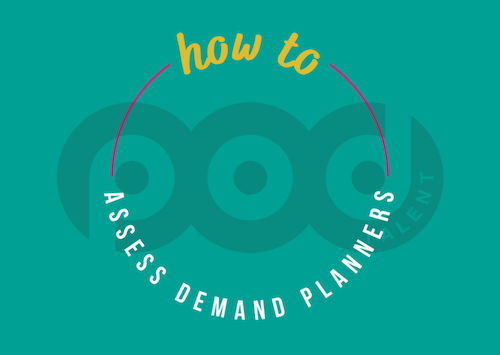Demand planning is crucial to many large or growing businesses, especially in FMCG. It is a specialist and highly sought-after skill, making it a challenging role to recruit for; there are almost always more vacancies than there are available planners. Planners have to use their analytical skills and commercial acumen to take into account large, complex data sets, as well as a whole range of other considerations, to make an educated guess as to what is going to sell and therefore how much product to manufacture. Too little and you lose out on sales; too much and product goes to waste. This article gives an insight into what to think about when assessing demand planners, and what questions you can ask in an interview.
Industry
As with any supply chain role, industry background is often important. Trying to plan the retail demand for fruit and veg, which needs to be purchased by the consumer within days, is very different to planning the demand for power tools, which do not expire. Conversely, grocery is comparatively cheap and an amount of wastage can naturally be expected, whereas an over-optimistic demand plan for consumer electronics could be extremely costly, especially when they become old fashioned.
Questions interviewers can ask:
What makes your industry background unique?
What considerations do you need to take into account regarding inventory parameters for the products you plan for?
How many SKUs do you plan for and what are they?
What seasonal or promotional implications do you need to take into account when demand planning?
Is shelf-life something you need to think about in your current role?
Competencies:
Can you give me an example of when you have transferred your skills between roles or industries before? How did you go about this change?
Can you talk me through the process of how you create a demand plan within your current role?
What challenges do you think you would initially face when transferring into our industry?
Stakeholders
Asking about a demand planner’s key stakeholders is important because it gives us a good insight into their responsibility and visibility within a company. Some demand planners are used to generating forecasts which are then signed off and handled by a manager; others play a highly accountable role in a global formal S&OP process; others again will handle key customer accounts and hold close relationships with the relevant external stakeholders. It is important to find this out in order to gauge how comfortable a demand planner will be in your company and what skills they have beyond analytics and forecasting.
Questions interviewers can ask:
What is your current team structure and who are your key internal stakeholders?
Who are your key external stakeholders and how do you interact with them?
Do you have the final say in your own demand forecast? Who do you present it to?
What is your involvement in S&OP?
Competencies:
How would you respond if you feel a key customer is being overly optimistic with their sales forecast?
Tell me about a stakeholder you have had a challenging relationship with. What did you do to overcome this?
Covid
The effect of the coronavirus pandemic on supply chain is extremely topical. Company industry has largely governed whether a business has boomed or crumbled under the lockdown restrictions over the past 12 months. Unprecedented constraint in supply or the sudden inability to sell through the usual channels meant that the sales figures on which demand planners usually rely to build future forecasts became obsolete. Probing into how candidates dealt with a period of such irregularity is a great way to assess their skills and adaptability.
Questions Interviewers can ask:
What was the effect of Covid on your business?
From a supply chain perspective, what was the biggest thing you learned during 2020 & Covid?
What did Covid change about the way you plan demand?
Competencies
How are you planning to account for the possibility of further interruptions to your supply chain in the next 1-2 years?
How will you adapt your forecasting method to adjust to the easing of restrictions this spring/summer?
Systems & Languages
Think about how important skills like these are to your vacancy. It may be extremely useful for a customer demand planner to speak a foreign language! Is Excel the bread and butter of your operation, or have you just rolled out SAP or a statistical forecasting tool? Sometimes these skills will be less important compared others, but they are important to think about when identifying the ideal candidate.
In essence, there are a lot of factors to consider when thinking about the role a demand planner will play in your business and this will dictate what sort of candidate you look for to fill these vacancies. A variety of the questions above should provide some useful guidelines for what to look out for and how to ask relevant interview questions.
If you'd like any additional or similar advice, feel free to drop us a line on info@pod-talent.com

